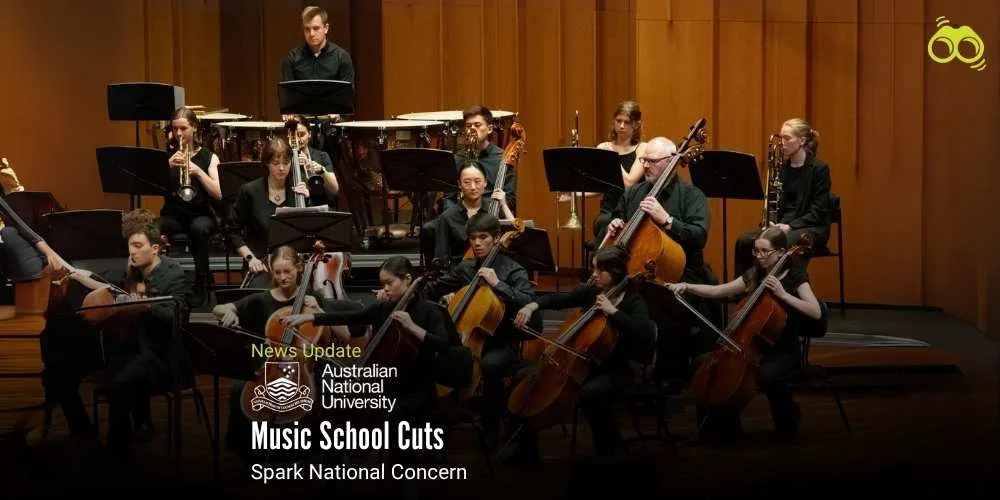Arts Education at Risk: ANU’s School of Music Faces Staff Cuts and De-establishment
Restructuring at ANU Sparks Concern Over Future of Creative Disciplines
The Australian National University (ANU) is facing mounting criticism over proposed changes to its School of Music, which reportedly include substantial staff reductions and a significantly reduced curriculum. These restructuring plans have raised alarm among stakeholders, particularly within the arts education sector, who fear that the university’s long-standing leadership in music education may be compromised. In response, the National Advocates for Arts Education (NAAE) have issued strong objections, warning that the proposed changes could erode the quality and breadth of musical instruction and diminish ANU’s national and international reputation. According to the NAAE, such measures threaten to undermine decades of achievement and risk marginalising the arts in favour of more commercially oriented disciplines.
Furthermore, critics argue that ANU’s decision reflects a broader shift in institutional priorities, one that may devalue creative disciplines at a time when cultural education is already under pressure. As discussions continue, calls for transparency and meaningful consultation with staff, students, and the wider community are intensifying.
Reports indicate that one-on-one music lessons have already ceased, and that the School of Music is being de-established. Under the university’s broader Renew ANU plan, 59 research and innovation roles are set to be cut across several colleges. Additionally, the School of Music, the School of Art and Design, and the Centre for Museum and Heritage Studies will be merged into a single academic unit.
In a media statement, NAAE Chair Dr John Nicholas Saunders described the proposed changes as deeply concerning for both ANU and the wider cultural and educational sectors. He emphasised that the ANU School of Music has long served as a leading centre for music training, research, and performance, not only in Canberra but across Australia and internationally. Dr Saunders cautioned that scaling back the school’s scope could represent a retreat from ANU’s national role in supporting the arts.
While acknowledging the financial pressures facing Australian universities, the NAAE urged ANU to take a leadership role in strengthening music education. In a letter addressed to Vice-Chancellor Professor Genevieve Bell, the organisation proposed measures to enhance equity and increase enrolments, including the introduction of ATAR bonus points for students who have completed senior secondary arts subjects. The NAAE also called for genuine consultation with students, staff, alumni, and the broader community before finalising any decisions. The letter suggested that ANU has an opportunity to demonstrate visionary leadership by supporting and reimagining tertiary music education in Australia. Public concern continues to grow, with a Facebook page titled Save ANU School of Music emerging as a focal point for criticism and personal testimonies. Many contributors have expressed frustration over the lack of transparency and shared accounts of anxiety among students and staff.
To date, ANU has not released full details of the restructuring, fuelling further speculation. The move is seen as part of a national trend, with over 40 creative arts courses having been cut since 2018. The 2020 Job-Ready Graduates Scheme, which increased fees for arts degrees by up to 113%, has been partially blamed for this decline. In this broader context, many view the proposed cuts at ANU as both symbolic and damaging. With a national shortage of qualified music teachers, critics argue that ANU should be reinforcing its commitment to the arts rather than withdrawing support. Dr Saunders reiterated that ANU ought to lead efforts to expand access to music education, not diminish its role. The NAAE has offered to collaborate with the university to identify sustainable solutions that preserve its legacy while addressing current challenges.
With national stakeholders observing closely, ANU’s response is expected to carry significant implications for the future of creative disciplines within Australian higher education. The proposed restructuring of ANU’s School of Music has sparked a national debate on the value of arts education and the responsibilities of leading institutions in safeguarding cultural and academic heritage.
Editor’s Note:
The situation unfolding at the Australian National University (ANU) highlights a growing concern about the future of arts education within Australian higher education. The proposed changes to ANU’s School of Music, marked by staff cuts, course reductions, and structural mergers, have prompted strong responses from educators, students, and the wider community. The ANU School of Music has long been recognised for its excellence in music education and research. Its potential downsizing raises serious questions about the university’s continued commitment to the arts. As noted by the National Advocates for Arts Education (NAAE), such changes risk eroding decades of achievement and leadership in this field.
Skoobuzz believes that financial sustainability should not come at the expense of creative disciplines. Music and the arts are essential to education, cultural identity, and community well-being. Universities like ANU must engage openly with stakeholders and pursue balanced solutions that protect the quality and accessibility of arts education while responding to current challenges.














0 Comments (Please Login To Continue)